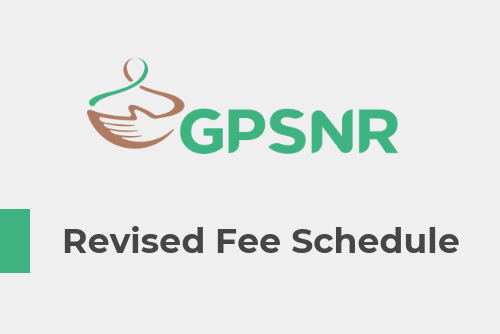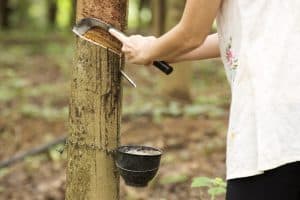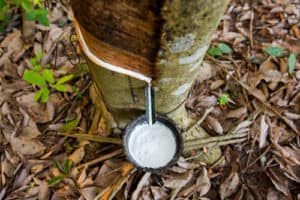The Executive Committee has approved revisions to the GPSNR Fee Schedule.
In accordance with the terms set out in the GPSNR Statutes, the new Fee Schedule will take effect from 23 February 2021.
To view the revised Fee Schedule, click here.

The Executive Committee has approved revisions to the GPSNR Fee Schedule.
In accordance with the terms set out in the GPSNR Statutes, the new Fee Schedule will take effect from 23 February 2021.
To view the revised Fee Schedule, click here.

Since its establishment a few months ago, the Smallholders Representation Working Group has been working consistently and collectively to accomplish its mission. The group has been actively involved in understanding, strategizing and testing the methods by which the platform can ensure adequate and relevant smallholder inclusion.
In its work to date, the group has selected 11 Working Group members as “Country Champions” who have extensive regional knowledge regarding the rubber supply chain. These members have been in charge of conducting interviews of various smallholder associations and organizations in their assigned country or region. The Working Group also refers to these “Country Champions” as “GPSNR Ambassadors” because of the role they play in creating awareness about the platform. In the past few months, they have helped promote the platform internationally, specifically in Natural Rubber producing countries, by interacting with several organizations, companies and government authorities in different regions of the world. This in turn has helped create curiosity and interest regarding the platform with local stakeholders and in the international rubber community.
To further this process, the Working Group is currently planning on organizing a series of workshops in various rubber producing regions of the world, including Indonesia, Thailand and Vietnam in Asia Pacific, Brazil in Latin America and Cote d’Ivoire, Ghana and Liberia in Africa. The objective of these workshops will be to understand the local needs and motivations of smallholders and onboard organizations representing smallholders to join the platform. The Working Group agreed these workshops will be a chance to facilitate an open and constructive discussion between the participants, including smallholders, smallholder representatives and other rubber stakeholders. By organizing multiple workshops in different regions of the world, the Working Group is trying to ensure appropriate coverage of the vast and diverse global natural rubber supply chain.
Through these workshops and the onboarding work done by the Country Champions, the group will be able to identify relevant smallholder representatives, in view of onboarding them as GPSNR members, to ensure smallholders representation in the GPSNR governance is achieved by the next General Assembly in March 2020.
It has been encouraging to see volunteer members of the Working Group actively participate and contribute to fulfill the tasks and responsibilities assigned to the team. Going forward, the Working Group Co-chair expects more involvement of the members as the group implements its developed action plan of organizing regular events like the regional workshops aimed at the betterment of Rubber Smallholders.

GPSNR Members Webinar | 3 March 2021, 8:00PM (GMT+8)
Join the Chairs and Co-Chairs of the Executive Committee and Working Groups as they share more on their current projects and upcoming highlights. Members will be able to pose queries to the panelists during the live Q&A session.
Further to the receipt of several submissions in response to the Environmental Risk Study request for Proposals, the Strategy and Objectives Working Group has now selected the Proforest team, together with consultant Liza Murphy, to conduct the environmental risk study. The team will be reaching out to GPSNR members to have initial scoping conversations in support of the study.
The Equity Sub-Working Group has drafted a summary for the Living Income studies undertaken in Thailand and Indonesia next year. Pending approval from the Sub-Working Group and S&O Working Group Members, the summary will be released to all GPSNR members and a webinar will be held to present the responses.
Representatives from each of the platform’s other Working Groups have started to draft their Working Group’s Theory of Change. At the end of the month, the Strategy and Objectives Working Group will consolidate this information and develop a platform-wide Theory of Change.
The Policy Toolbox Working group has received initial proposals for the development of Implementation Guidance request for proposals (RFP) and will be meeting to discuss and select a proposal.
The Working Group will be setting up focus groups for category members to participate in the development of the implementation guidance. The call to join will be in the newsletter and also in the other article to be published.
In the next weeks, the Working Group will also be developing a new RFP for a consultant to help refine the reporting requirements based on the BRR pilot done last year. The consultant will work to bring the questions into alignment with other reporting systems (e.g. CDP and Ecovadis) and ensure that the questions are phrased in a suitable manner.
The Capacity Building Working Group conducted a webinar to share about the national CB strategies and recruit members to the national sub-groups. (Click here to view recording and slide deck)
The ‘Traceability and Transparency’ Working Group has now set up 3 sub-groups that will focus on different tasks: refining the WG theory of change, developing a definition of traceability and minimum acceptable levels of traceability, and developing a data collection process with Policy Toolbox Working Group members.
The Smallholder Representation Working Group has completed logistical organization of the Smallholders caucus call, that will happen tomorrow, 25th February. The caucus call will allow sharing and collaboration among smallholders across national lines.
© 2022 All rights reserved
Global Platform for Sustainable Natural Rubber

| Cookie | Duration | Description |
|---|---|---|
| cookielawinfo-checkbox-advertisement | 1 year | Set by the GDPR Cookie Consent plugin, this cookie is used to record the user consent for the cookies in the "Advertisement" category . |
| cookielawinfo-checkbox-analytics | 11 months | This cookie is set by GDPR Cookie Consent plugin. The cookie is used to store the user consent for the cookies in the category "Analytics". |
| cookielawinfo-checkbox-functional | 11 months | The cookie is set by GDPR cookie consent to record the user consent for the cookies in the category "Functional". |
| cookielawinfo-checkbox-necessary | 11 months | This cookie is set by GDPR Cookie Consent plugin. The cookies is used to store the user consent for the cookies in the category "Necessary". |
| cookielawinfo-checkbox-others | 11 months | This cookie is set by GDPR Cookie Consent plugin. The cookie is used to store the user consent for the cookies in the category "Other. |
| cookielawinfo-checkbox-performance | 11 months | This cookie is set by GDPR Cookie Consent plugin. The cookie is used to store the user consent for the cookies in the category "Performance". |
| PHPSESSID | session | This cookie is native to PHP applications. The cookie is used to store and identify a users' unique session ID for the purpose of managing user session on the website. The cookie is a session cookies and is deleted when all the browser windows are closed. |
| viewed_cookie_policy | 11 months | The cookie is set by the GDPR Cookie Consent plugin and is used to store whether or not user has consented to the use of cookies. It does not store any personal data. |
| Cookie | Duration | Description |
|---|---|---|
| ac_enable_tracking | 1 month | This cookie is set by Active Campaign to denote that traffic is enabled for the website. |
| Cookie | Duration | Description |
|---|---|---|
| _ga | 2 years | The _ga cookie, installed by Google Analytics, calculates visitor, session and campaign data and also keeps track of site usage for the site's analytics report. The cookie stores information anonymously and assigns a randomly generated number to recognize unique visitors. |
| _gat_gtag_UA_139883466_1 | 1 minute | Set by Google to distinguish users. |
| _gid | 1 day | Installed by Google Analytics, _gid cookie stores information on how visitors use a website, while also creating an analytics report of the website's performance. Some of the data that are collected include the number of visitors, their source, and the pages they visit anonymously. |
| CONSENT | 2 years | YouTube sets this cookie via embedded youtube-videos and registers anonymous statistical data. |
| Cookie | Duration | Description |
|---|---|---|
| NID | 6 months | NID cookie, set by Google, is used for advertising purposes; to limit the number of times the user sees an ad, to mute unwanted ads, and to measure the effectiveness of ads. |
| VISITOR_INFO1_LIVE | 5 months 27 days | A cookie set by YouTube to measure bandwidth that determines whether the user gets the new or old player interface. |
| YSC | session | YSC cookie is set by Youtube and is used to track the views of embedded videos on Youtube pages. |
| Cookie | Duration | Description |
|---|---|---|
| AWSALBTG | 7 days | No description available. |
| AWSALBTGCORS | 7 days | No description available. |
| FORMASSEMBLY | session | No description available. |
| GetLocalTimeZone | session | No description |
| prism_650657595 | 1 month | No description |